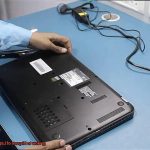Congratulations on your decision to switch to solar panels.
Not only are you saving money on energy bills, but you’re also reducing your carbon footprint. However, have you ever considered what happens to your solar panels once they’ve reached the end of their lifespan?
Like any electronic device, solar panels don’t last forever. So, it’s important to know how to dispose of them properly.
Improper disposal of solar panels can pose potential health hazards due to hazardous materials like lead and cadmium. These toxic substances can seep into the soil and water, harming both the environment and people in the surrounding areas.
That’s why it’s crucial to dispose of solar panels safely and responsibly. In this blog post, we’ll explore some of the best ways to dispose of solar panels.
We’ll cover recycling options and repurposing ideas so that you can make an informed decision about what works best for you. Whether you’re a homeowner or a business owner, understanding proper solar panel disposal is essential for protecting our planet and its inhabitants.
So, let’s dive in.
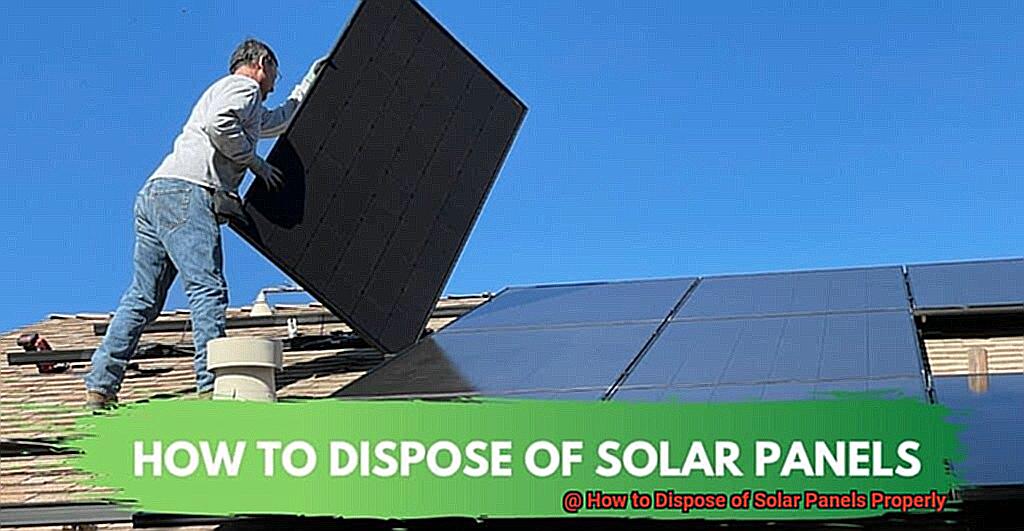
What are Solar Panels?
Contents
Solar panels are the superhero of renewable energy sources.
These devices work by converting sunlight into electricity through a process called the photovoltaic effect. The magic happens within photovoltaic cells that are made of semiconducting materials like silicon.
When sunlight hits the cell, it triggers a reaction that causes electrons to move and create an electric current. Solar panels come in all shapes and sizes, but they typically take the form of a panel or array that can be mounted on a rooftop or on the ground.
They are used for a variety of purposes, from powering homes and businesses to providing electricity to remote areas and even fueling small electronic devices like calculators or watches. The popularity of solar panels has exploded in recent years, thanks in part to their ability to provide clean, renewable energy.
Unlike traditional energy sources such as coal or oil, solar panels produce no greenhouse gas emissions or other pollutants during operation. This makes them an eco-friendly and sustainable option for generating electricity.
However, like any electronic device, solar panels have a limited lifespan and eventually need to be disposed of properly. This is crucial to prevent environmental harm and ensure the safe handling of potentially hazardous materials.
Thankfully, there are many options available for proper disposal of solar panels. Many manufacturers offer recycling or disposal programs, while local recycling centers or electronic waste facilities may also accept solar panels for recycling.
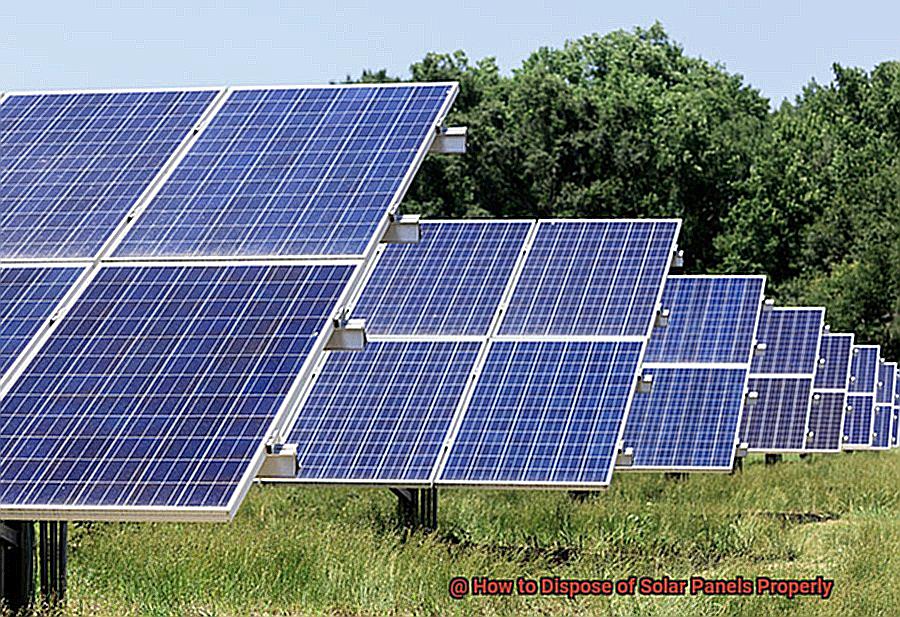
Additionally, donating or selling old solar panels can help extend their lifespan and promote sustainability. Overall, solar panels are a powerful tool for generating clean and sustainable energy.
Why is Proper Disposal Important?
Solar panels are the superheroes of the energy world, harnessing the power of the sun to help save the planet.
The first reason why proper disposal of solar panels is important is that they contain hazardous materials that can be harmful to both the environment and human health if not disposed of properly.
Toxic materials like lead and cadmium can seep into the soil and groundwater if they end up in landfills. This can cause a range of environmental problems and can even lead to serious health issues for people living nearby.
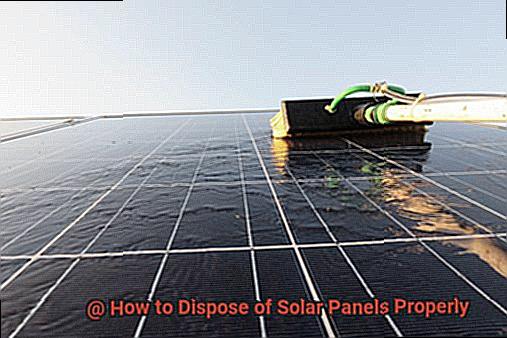
Another crucial reason why disposing of solar panels correctly is so important is that it promotes sustainability. These panels are built to last for decades, but when they reach the end of their lifespan, they need to be replaced.
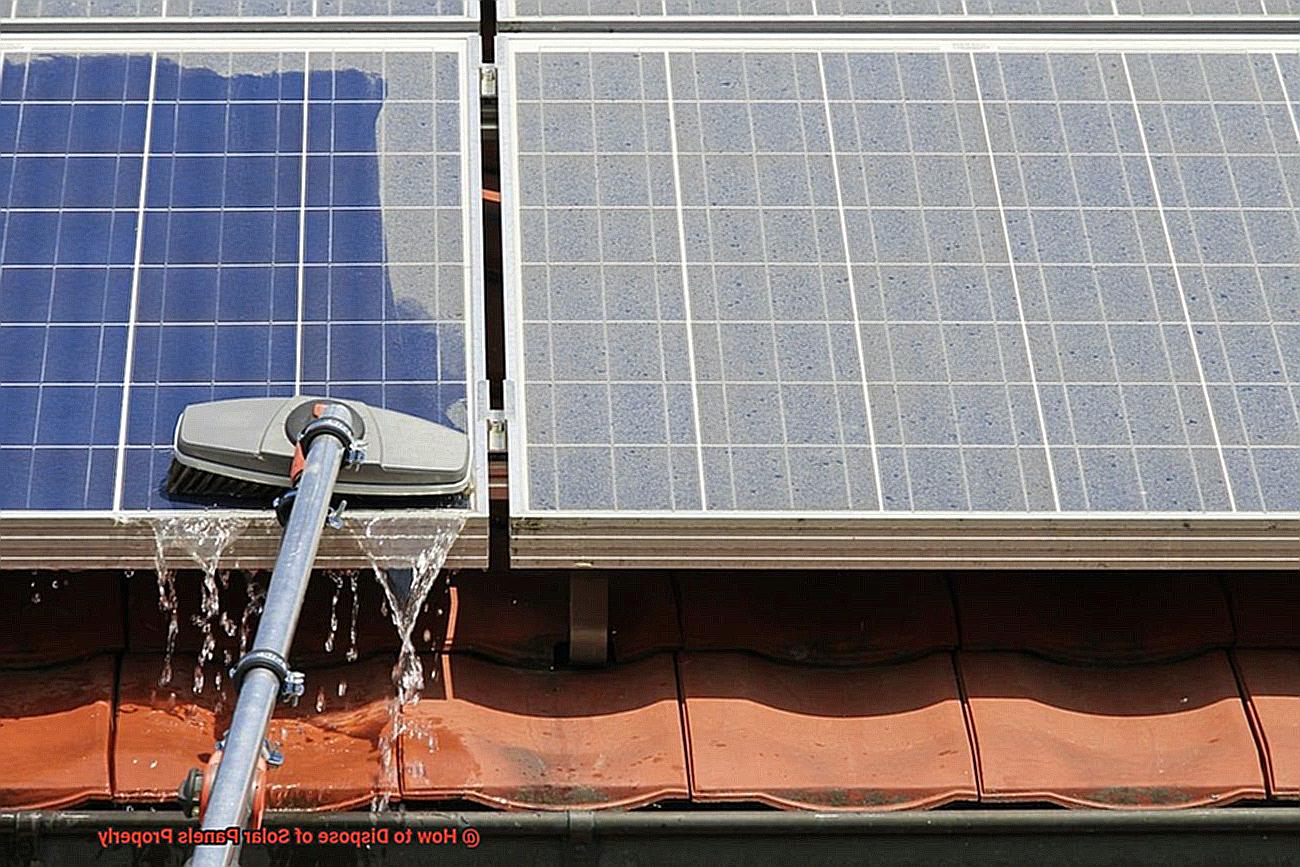
By disposing of old panels responsibly, we can recover valuable materials like aluminum, silver, and glass that can be reused in new panels. This reduces the need for raw materials and minimizes the energy-intensive manufacturing processes required to create new panels.
Lastly, proper disposal helps prevent illegal dumping and e-waste. When people don’t know how to dispose of their solar panels properly, they might resort to illegal dumping, which can have devastating effects on the environment.
E-waste from discarded solar panels can also pose a serious threat to public health and the environment.
Check with the Manufacturer
As solar panels reach the end of their life cycle, it’s crucial to dispose of them in a responsible manner to avoid damaging the environment.
This is where the manufacturer comes in – they hold the key to properly disposing of your panels.
Each manufacturer has their own set of guidelines for disposal. By checking their website or reaching out to customer service, you can discover how to dispose of your solar panels safely and effectively.
If the manufacturer offers a take-back or recycling program, follow their instructions to dispose of your panels.
This may include returning the panels to the manufacturer or designated recycling facilities. The best part?
Some manufacturers may even cover the cost of shipping and disposal. But what if your manufacturer doesn’t offer a take-back program?
They can still provide you with guidance on how to dispose of your panels in an eco-friendly manner. They may suggest reaching out to local recycling facilities or hazardous waste disposal centers.
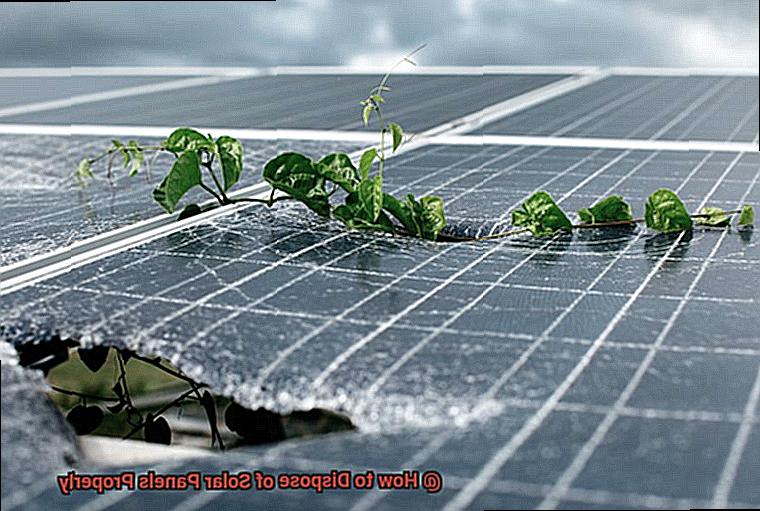
By checking with the manufacturer, you’re ensuring that your solar panels take their final bow as true heroes, protecting our planet from harm.
Local Recycling Centers and Electronic Waste Facilities
As environmentally conscious citizens, we all know the importance of responsible disposal when it comes to solar panels.
Before you grab your cape and head out to save the day, it’s essential to do some research.
You need to know the regulations of your local recycling center or electronic waste facility before disposing of your solar panels. It’s important to note that not all facilities are created equal.
Some may not accept certain types of solar panels, while others may charge a fee for disposal. So, be sure to check with the facility first and confirm that they accept your solar panels for proper disposal.
Once you’ve confirmed that the facility is equipped for handling solar panels, you can bring them in for recycling. The process typically involves breaking down the panels into their individual components such as glass, aluminum, and silicon cells.
These components can then be recycled and used in the production of new solar panels or other electronic devices. However, it’s vital to note that some states and countries have laws and regulations regarding the disposal of electronic waste, including solar panels.
Make sure you check with your local government to ensure that you are following proper disposal procedures and avoiding any potential fines or penalties. In conclusion, taking your solar panels to a local recycling center or electronic waste facility for proper disposal is an excellent way to help protect our planet.
Researching local regulations is a crucial step in responsibly disposing of solar panels.
Selling or Donating Used Solar Panels
In fact, it’s like having a superhero’s utility belt at your disposal, full of various tools and resources to explore when it comes to disposing of your used solar panels.
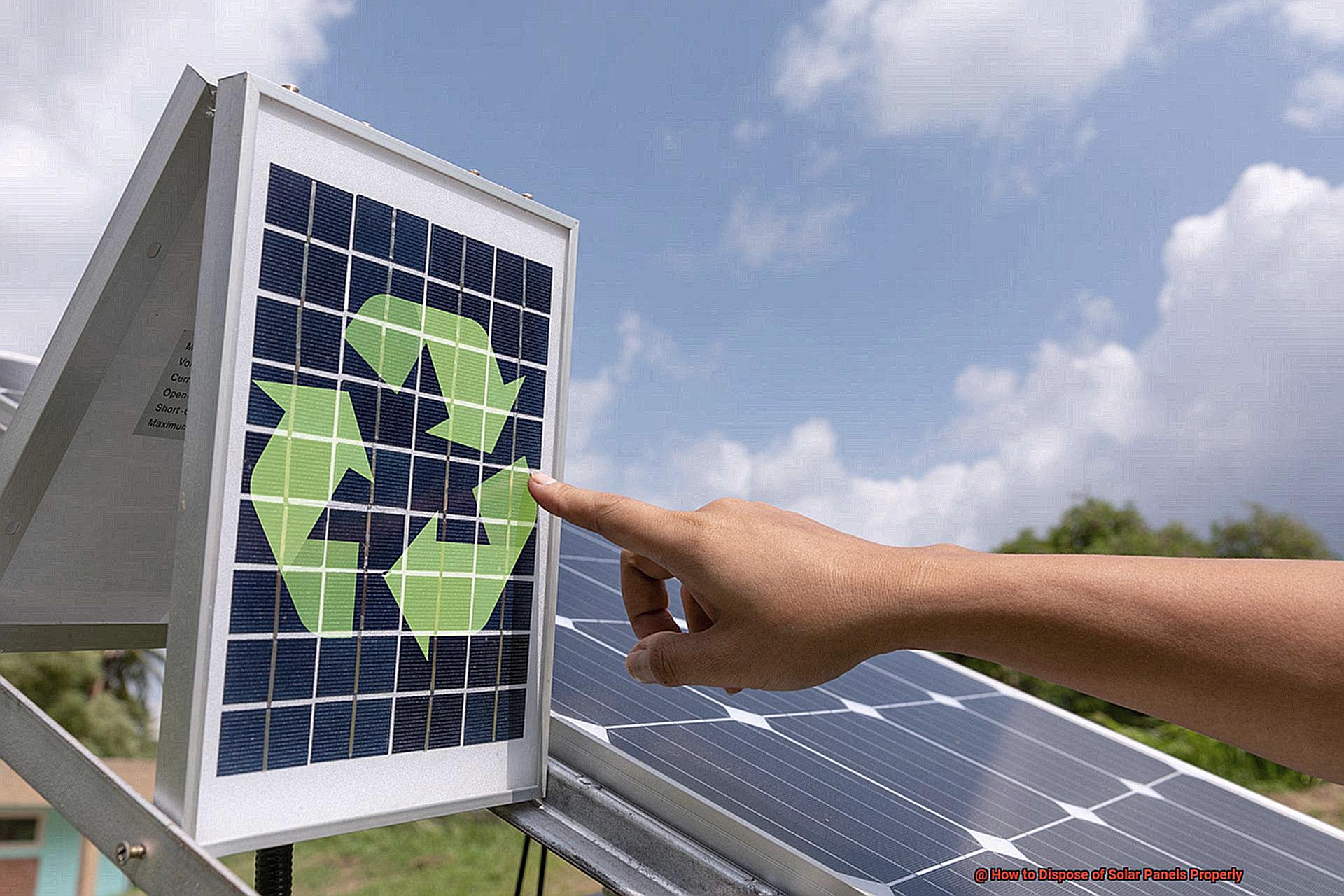
One option is selling them online through popular marketplaces such as eBay or Craigslist. It’s like putting up a “for sale” sign on your front lawn but with a much larger audience.
Be sure to provide accurate descriptions of the condition of the panels and clear photos so potential buyers know exactly what they’re getting. You could also consider reaching out to local solar companies or installers who may be interested in purchasing your panels for a discounted price.
Another option is donating your used solar panels to organizations in your community that support renewable energy initiatives. Think of it like donating old clothes to a thrift store – it’s still useful to someone else.
Non-profits, schools, and community centers are just a few examples of places that may accept donations of used solar panels. Research organizations in your area that would benefit from your donation.
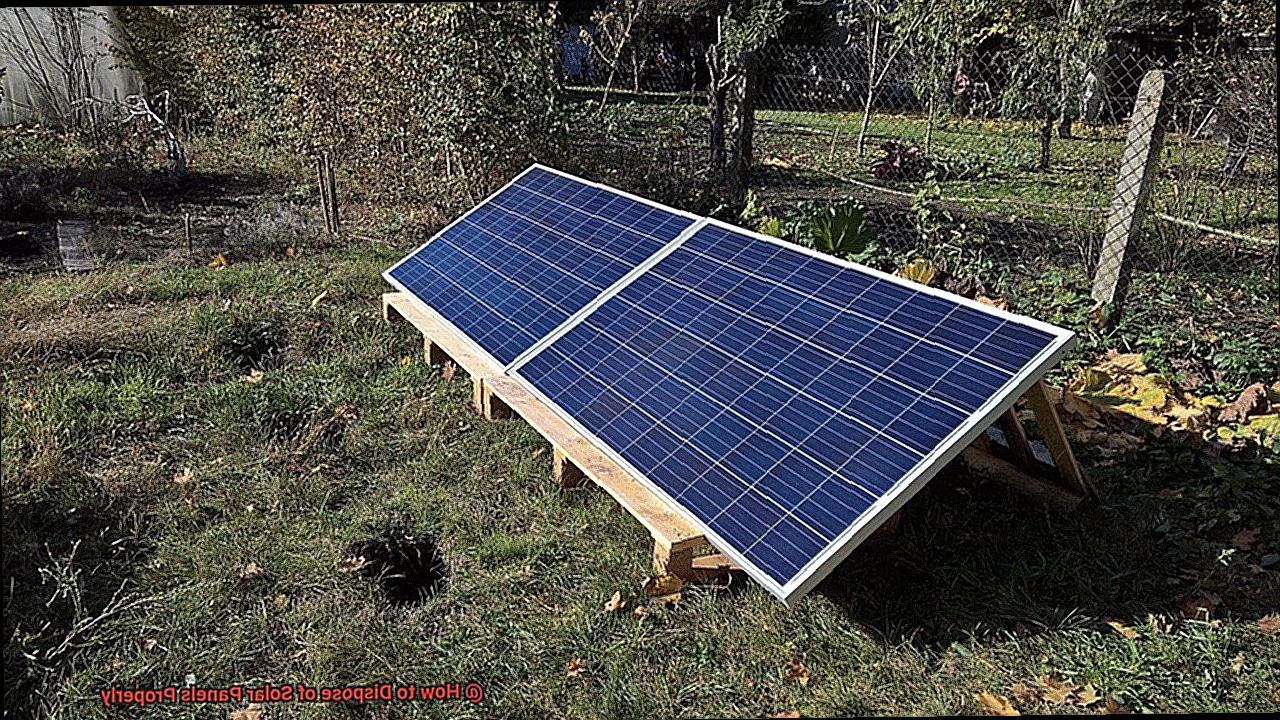
However, before you sell or donate your used panels, ensure that they are in good working condition. It’s important to ensure that the panels will function properly for their new owners.
If they’re not working as they should, recycling them is the best option. Always be sure to follow any guidelines or regulations set forth by your local government regarding electronic waste disposal.
Illegal Dumping of Solar Panels
You’re strolling through a serene park, soaking up the sun’s warm rays and enjoying the fresh air.
Suddenly, your peaceful walk is interrupted by a pile of discarded solar panels haphazardly dumped off to the side. You might brush it off as just some old panels, but did you know that illegal dumping of solar panels is a significant environmental issue that can have disastrous consequences for our communities?
Solar panels are designed to capture the sun’s energy and produce clean electricity. However, they also contain hazardous materials like lead and cadmium, which can contaminate soil and water sources if not disposed of properly.
Unfortunately, some individuals or businesses resort to illegal dumping of solar panels in unauthorized locations like abandoned lots or public parks. This reckless behavior poses a severe threat to our environment and puts our health and safety at risk.
Not only is illegal dumping of solar panels harmful, but it’s also against the law. Those caught violating regulations related to electronic waste disposal can face heavy fines and legal consequences.
To avoid these penalties, it’s crucial to dispose of solar panels through authorized channels and methods. Thankfully, many states have established guidelines for the proper disposal of solar panels.
Some require that solar panels be recycled through licensed facilities, while others may allow hazardous waste collection programs to handle small quantities of solar panels.
By following these regulations, we can ensure that toxic materials are disposed of appropriately, safeguarding our environment and communities from harm.
filrKYLQeU0″ >
Conclusion
In conclusion, transitioning to solar panels is a smart move for both your wallet and the planet.
But what happens when these panels reach their end of life? It’s important to consider the proper disposal methods to avoid potential health hazards caused by hazardous materials like lead and cadmium.
Thankfully, there are several ways to dispose of solar panels responsibly. Manufacturers often have specific guidelines for disposal, while local recycling centers and electronic waste facilities can also accept used solar panels for recycling.
Another option is selling or donating used panels to extend their lifespan and promote sustainability. It’s crucial to follow correct disposal procedures and avoid illegal dumping, which can harm our environment and communities.
By disposing of old panels safely, we can recover valuable materials that can be reused in new panels, reducing the need for raw materials and minimizing energy-intensive manufacturing processes. Ultimately, understanding proper solar panel disposal is vital for protecting our planet and its inhabitants.

